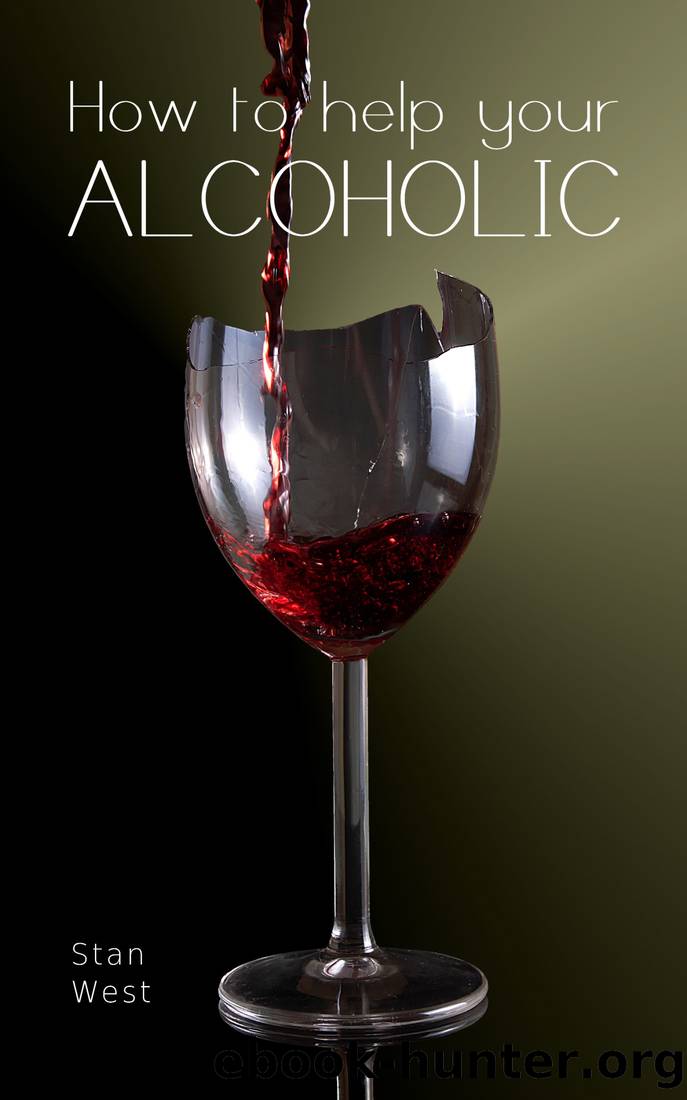How to Help Your Alcoholic by Stan West

Author:Stan West [West, Stan]
Language: eng
Format: epub
Tags: addiction, alcoholic, alcoholism, emotions, recovery, triggers, relapse
Publisher: AOB Books
Published: 0101-01-01T00:00:00+00:00
If an alcoholic feels unhappy they crave alcohol, and if they are distressed they crave alcohol. These cravings are completely automatic and beyond Leeâs direct control. Lee canât simply choose to be happy, and they canât choose to be relaxed. There are however things they can do to influence these states.
Spend some time identifying things that make Lee feel better, and in particular things that make Lee feel better within themselves. Prepare these so that they are ready to be engaged when Lee is low. Explore with Lee the possibility of doing some voluntary work; this brings a particularly valuable benefit in that it will make them feel good about themselves in an enduring way. Helping others lifts self-esteem, and when Lee feels good within themselves then their resolve will be high.
Time spent on their own is particularly difficult for Lee so take some time to come up with things they can do on their own that will fully occupy their minds; things that require concentration. This may be challenging at first as the overload of stimulant in Leeâs brain will make concentrating difficult, but even if they are only able to keep themselves occupied for small periods it will help. Activities that bring with them a simple âwinâ are particularly valuable. Are there some tasks that Leeâs been meaning to get done for quite a while? Some project theyâve spoken about but never got under way?
Time spent inside their own head is dangerous for an alcoholic as it is likely to result in distress. The difficulty here is how the brain deals with idle time. The brain likes information to be orderly and all issues resolved. While weâre busy doing something then our brain is fully occupied processing for that task. But when our brain is not fully occupied it brings back unresolved issues to consider them further in an effort to achieve closure. For an alcoholic this means that when they have idle time then the conflicting âdrinking is goodâ vs âdrinking is badâ issue will return and they will find themselves thinking about alcohol and arguing the proâs and conâs. But thinking about alcohol has the same effect in the brain as seeing alcohol. The brain believes that alcohol is close and a craving is launched to urge the alcoholic to acquire it, and acquire it now.
Events from the past that have gone badly are also going to spring constantly into Leeâs mind as the brain plays and re-plays the scenes in an attempt to find a better resolution. But the past canât be changed, so the bad occurrences remain unimproved, and dwelling on them achieves nothing but cause distress. The automatic response of Leeâs brain to distress is that it is relieved by drinking, so a craving is launched. The more Lee thinks about these issues the greater the distress and the bigger the craving. Lee needs to stop dwelling on issues in their past but this isnât easy to achieve as they arrive unbidden. This
Download
This site does not store any files on its server. We only index and link to content provided by other sites. Please contact the content providers to delete copyright contents if any and email us, we'll remove relevant links or contents immediately.
| Adult Children of Alcoholics | Alcoholism |
| Drug Dependency | Gambling |
| Hoarding | Obsessive Compulsive Disorder (OCD) |
| Sexual | Smoking |
| Substance Abuse | Twelve-Step Programs |
The Hacking of the American Mind by Robert H. Lustig(4361)
Right Here, Right Now by Georgia Beers(4194)
Fingerprints of the Gods by Graham Hancock(3982)
Goodbye Paradise(3794)
Bad Pharma by Ben Goldacre(3415)
Happiness by Matthieu Ricard(3037)
More Language of Letting Go: 366 New Daily Meditations by Melody Beattie(3017)
The Social Psychology of Inequality by Unknown(3011)
The Plant Paradox by Dr. Steven R. Gundry M.D(2599)
Drugs Unlimited by Mike Power(2584)
Confessions of a Shopaholic by Sophie Kinsella(2337)
Borders by unknow(2300)
Make Love Not Porn by Cindy Gallop(2097)
Dry by Augusten Burroughs(2090)
Stop Being Mean to Yourself: A Story About Finding the True Meaning of Self-Love by Melody Beattie(1982)
Getting Off by Erica Garza(1926)
Belonging by Unknown(1849)
Yoga and the Twelve-Step Path by Kyczy Hawk(1831)
Unmasking Male Depression by Archibald D. Hart(1797)
